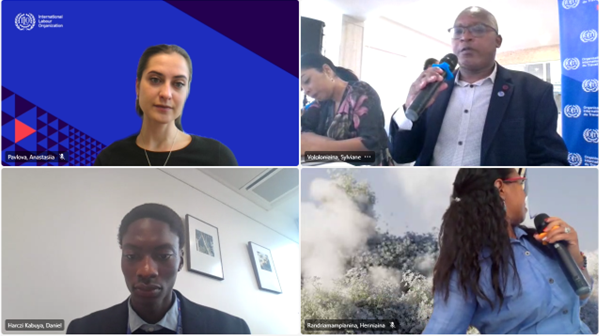
As part of the project to strengthen Madagascar horticulture value chains, the Emerging and Special Partnerships team, in support of the International Labour Organisation (ILO) national office for Antananarivo, has been exploring ways of stimulating decent work, increasing export potential and meeting the challenges through South-South and triangular cooperation in the sector.
Anastasiaa Pavlova and Daniel Harczi Kabuya took the floor at the round table to recall the SSTC’s approach based on solidarity and respect for national sovereignty between partners. With initiatives that include multi-actor partnerships, the SSTC focuses on exchanges of experience and solutions that can be adapted to local contexts, to strengthen decent work in strategic economic sectors, promoting horizontal collaboration between countries of the South to solve development problems together.
A well-thought-out approach to national and global challenges
The horticultural sector in developing countries faces a number of challenges, including lack of access to markets, post-harvest losses, low agricultural productivity and the impacts of climate change. The SSTC seeks to address these issues by promoting innovative solutions, such as the adoption of climate-smart agriculture, and by setting up training and support structures for young people and women involved in agriculture. This programme supports their entry into global supply chains through digitalisation and climate-smart agriculture. Study tours and training on EU standards for exports to the Rungis market illustrate the desire to strengthen local capacity to integrate into global markets.
Capacity building and sustainable development
The SSTC encourages local capacity building, including training for small farms and SMEs in partner countries. For example, exchanges between players in the horticultural sector enable them to share the production and safety standards imposed by international markets, thereby facilitating access to new outlets for horticultural products from the South. The programme also aims to promote a more equitable and inclusive value chain for young people and women in the agricultural sector.
The success of the SSTC also depends on the active participation of governments, workers’ organisations, international institutions and NGOs. These players provide essential support to ensure local ownership of the initiatives and maintain rigorous monitoring of the results, thereby guaranteeing the achievement of the Sustainable Development Goals (SDGs) as part of the 2030 Agenda.
Synergies and opportunities
These initiatives illustrate the SSTC’s ability to catalyse economic and social transformations through inter-regional exchanges and the active participation of local communities, thereby contributing to the achievement of the Sustainable Development Goals (SDGs). Synergies with other international organisations, such as the FAO and IFAD, promote the dissemination of best practice in sustainable agriculture, opening up opportunities for economic inclusion and rural development.
For more information, contact: the International Labour Organization (ILO) national office for Antananarivo.

